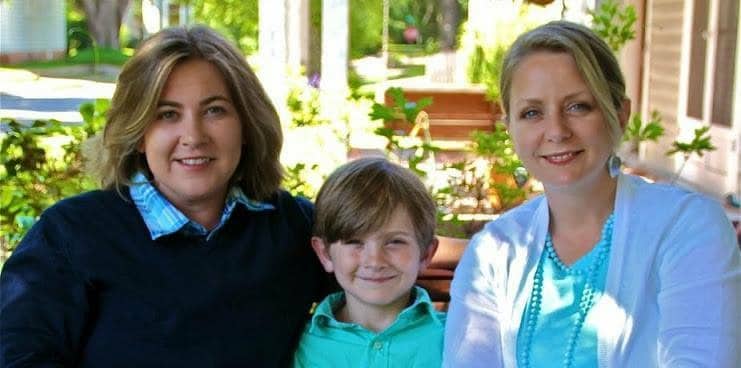By Jessa Reid Bolling | Staff Reporter
After her son was born with a life-threatening illness, never missing one of his doctor’s appointments, staying by his hospital bed, willing his tiny heart to keep beating, waiting for the open-heart surgery that would save his life, one Alabama woman never imagined she would be told by a nurse, “You are not his mother.”
This is exactly what happened to Cari Searcy and her partner Kim McKeand.
This is where their fight for parental rights began.
After having their son, Khaya, with the help of a donor, Searcy and McKeand were told he had a hole in his heart that would require open-heart surgery when he reached three months old. At two months, his weight began to drop and a feeding tube became necessary to help him survive long enough to receive the life-saving surgery.
When the emotional stress and pressure from nurses became too much for McKeand, Searcy offered to learn how to administer the tube in her partner’s place, only to be told by a nurse that she was not allowed to learn the procedure because she was not Khaya’s legal parent.
After Khaya was home recovering from surgery, Searcy pursued second parent adoption to have parental rights to him, only to be denied because she and McKeand were not married. One year later, a constitutional amendment banned same-sex marriage in Alabama.
Their legal battle continued over the next ten years when their case Searcy v. Strange legalized same-sex marriage for the state of Alabama in 2015 and Searcy could legally adopt Khaya. But the memory of that incident in the hospital twelve years ago remains strong in Searcy’s memory.
“At that moment, that’s when it hit me how important legal recognition is,” Searcy said. “How could I be an effective parent when I’m not even legally bound to my son? If anything happened to Kim during that time, there would have been nothing stopping the state from coming in and taking him away from me.”
This is only one story of the obstacles that same-sex couples face while building families in Alabama, a state where only 32 percent of citizens support same-sex marriage, according to a survey by the Public Religious Research Institute.
In May, Governor Kay Ivey signed House Bill 24, the Child Placing Agency Inclusion Act into law, allowing faith-based adoption agencies to reject prospective parents on religious grounds. This invited nationwide backlash against the state, with critics calling this bill discriminatory against same-sex couples seeking to adopt or foster children.
Eva Kendrick, director of Human Rights Campaign Alabama, said that the passage of HB24 is a blatant violation of the separation of church and state and that those guidelines are often ignored in Alabama and other states in the South.
While no state-funded agencies are eligible to reject prospective parents on religious grounds, Kendrick said these state-licensed and privately-funded organizations should not be allowed to deny couples. This is especially the case when same-sex couples are four times more likely to adopt and six times more likely to foster children than opposite-sex couples, she said.
“The point is not what agencies do and don’t offer services,” Kendrick said. “It’s that state-licensed agencies are not meeting minimum standards and how do we help people know what these agencies are so that they don’t have to have the experience of being turned away because a person has discerned that they aren’t an appropriate parent for a child.”
With the majority of the population of Alabama living in rural areas, Kendrick addressed the need for equal access for perspective LGBTQ+ parents who don’t live in more metropolitan areas and have easier access to a variety of adoption and foster agencies.
“For the many people who don’t live in the Birmingham or Huntsville or Montgomery or Mobile metropolises, there are less options,” Kendrick said. “So, if you live in a part of the state where the only option is a religious-affiliated agency, this bill is really scary for you.”
The bill, sponsored by Tuscaloosa’s own Rep. Rich Wingo (R), invited nationwide backlash from critics, who denounced the bill as state-licensed discrimination.
Wingo said that the bill only effects 30 percent of foster and adoption agencies in Alabama and that LGBTQ+ couples can still access the remaining 70 percent of agencies to pursue adoption or foster care.
“(HB 24) leaves about 70 percent of adoption agencies for [LGBTQ couples] to adopt and have the ability to foster,” Wingo said. “So they’re not being prevented at all, their rights aren’t being infringed upon at all. Everyone should have their rights and we’re just saying that we respect their rights, just respect ours.”
Representative Patricia Todd (D-Birmingham), the only openly gay public official in Alabama and prominent LGBTQ+ activist, said that HB 24 is only one of many obstacles that the LGBTQ+ community has had to fight and that progress cannot be stopped, even under the guise of “religious freedom.”
“To me, when we’re in the state house passing legislation, we’re not there representing our religions,” Todd said. “We’re there to represent the people in our district, many of whom happen to be queer. They’re ignoring the progress of the country, they’re trying to stop it, and I think they realize they’re not going to. They’re desperate and so they use the ‘religious freedom’ argument.”
Todd said that the rise of similar bills is nothing more than a backlash against the LGBTQ+ community after marriage equality was passed nationwide in 2015. She said activists have to be more vigilant now than ever.
“This is such a no-brainer to me, there are so many kids that need to be adopted,” Todd said. “Religious institutions need to get over it and they will. They’ll look back in time and realize they were wrong, just like people who opposed the Civil Rights movement. To win the war, sometimes you have to lose a couple of battles along the way. We’ll win this fight.”
Now married and legally recognized as parents, Searcy and McKeand continue to live in Mobile with their son, Khaya, now a healthy 12-year-old. Their family’s fight may be over, but they remain vigilant against legislation like HB 24, that can prevent other same-sex couples from building families of their own.
“It’s very frustrating to me when people cite religious freedom as the reason for these (anti-LGBTQ+) laws,” Searcy said. “What about our freedoms? Just because we’re gay doesn’t mean we’re less religious or less moral. Excluding gay couples like this is directly writing discrimination into the law. I think our country and our state should be better than that.”







